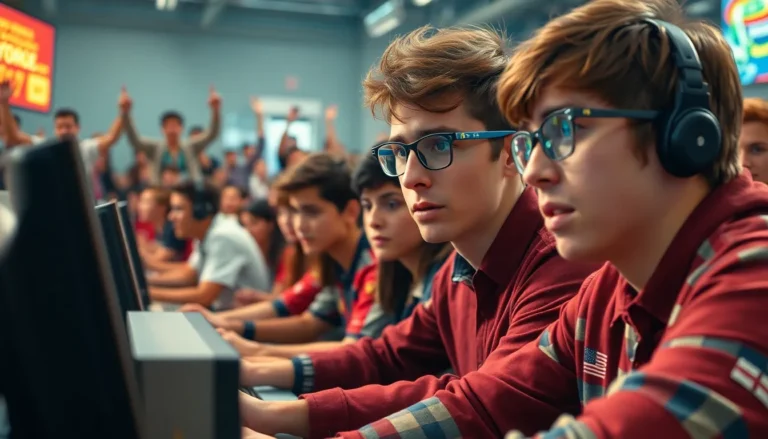In a world where the line between traditional sports and digital competition blurs, the question arises: is esports a real sport? Picture this: athletes in sweatpants, eyes glued to screens, fingers dancing across keyboards like a pianist at a grand concert. While some may scoff at the idea, the rise of esports has transformed gaming from a pastime into a global phenomenon, complete with roaring crowds and multi-million dollar prizes.
Is Esports A Real Sport
Esports represents a significant shift in the perception of gaming as a serious competition. Its structured format combines skill, strategy, and teamwork, fostering a unique environment for participants and fans.
Definition of Esports
Esports refers to competitive video gaming, where individuals or teams compete against each other in specific titles. Popular games include League of Legends, Dota 2, and Counter-Strike: Global Offensive. These competitions often occur in tournaments, attracting large audiences both online and in-person. Organizations sponsor professional teams, creating a vibrant ecosystem around esports. Gamers typically display a high level of skill, dedication, and practice, akin to traditional athletes.
The Rise of Competitive Gaming
Competitive gaming has surged in popularity over the past two decades. Streaming platforms like Twitch and YouTube significantly contribute to this growth, enabling gamers to showcase their skills globally. In 2021, esports revenue reached approximately $1.08 billion, reflecting its thriving market. Major competitions, such as The International and the League of Legends World Championship, draw millions of viewers. This rising interest has led to increased recognition from mainstream sports organizations, further validating esports as a legitimate form of competition.
Arguments For Esports as a Real Sport

Esports represents a unique blend of competition, skill, and strategy that challenges traditional definitions of sports. Players engage in intense gameplay, displaying remarkable skill and precision.
Skill and Strategy
Skill in esports parallels traditional sports. Players must master complex mechanics, strategies, and gameplay tactics. Game titles like League of Legends and Dota 2 require in-depth knowledge, quick decision-making, and exceptional teamwork. These elements demand similar intellectual rigor to chess or basketball. Top-tier players dedicate hours to practice, analysis, and execution, underscoring the meticulous nature of competition. The strategic depth in esports often involves real-time problem-solving, akin to the strategies employed in football or soccer. Successful teams rely on synergy and communication, reflecting valuable collaboration skills essential in any sport.
Physical and Mental Endurance
Endurance plays a crucial role in esports. Players sustain focus during matches lasting several hours, necessitating exceptional concentration and mental stamina. Cognitive skills, such as quick reflexes and adaptive strategies, enhance overall performance. Emotional control remains vital; players navigate high-pressure situations where split-second decisions affect outcomes. Additionally, physical health impacts success in competitive gaming. Maintaining optimal physical condition can enhance reaction times and overall gameplay. To excel, esports athletes often engage in fitness regimens, paralleling traditional athletes’ training routines. The dedication to both mental and physical well-being demonstrates the seriousness of esports as a legitimate competitive pursuit.
Arguments Against Esports as a Real Sport
Critics argue against classifying esports as a real sport for several reasons.
Lack of Physical Activity
Many opponents emphasize the minimal physical activity involved in esports. Unlike traditional sports, where athletes engage in rigorous physical training and competition, esports predominantly require mental agility and hand-eye coordination. Players often sit for extended periods, which some argue detracts from the athleticism typically associated with sports. Skeptics believe that without sustained physical exertion, esports can’t fulfill the definition of a sport established by entities like the International Olympic Committee.
Traditional Sports Criteria
Another significant argument revolves around traditional sports criteria. Many enthusiasts expect sports to include components like physical stamina, teamwork in a physical environment, and outdoor participation. The lack of these elements in esports raises questions about its validity as a sport. Furthermore, critics point out that governing bodies, such as FIFA or the NCAA, don’t include esports in their classifications, reinforcing the perception that esports doesn’t meet conventional standards. These contrasting views stimulate ongoing discussions about what constitutes a legitimate sport.
The Evolving Perception of Esports
Esports increasingly garners attention as it grows in significance. Gaming tournaments attract not only players but also vast audiences, showcasing the competitive spirit inherent in esports.
Media Coverage and Broadcasting
Media outlets extensively cover esports events, demonstrating their rising popularity. Networks like ESPN and platforms like Twitch provide dedicated coverage, reaching millions of viewers across the globe. Viewership statistics show that major tournaments can draw over 10 million concurrent viewers, highlighting the level of interest. Broadcasters often include analysis, commentary, and highlights, treating esports similarly to traditional sports broadcasts. This extensive media presence helps legitimize esports while allowing broader audiences to engage with competitive gaming.
Recognition by Sports Organizations
Esports has begun to receive recognition from numerous sports organizations. In 2018, the International Olympic Committee acknowledged esports by including discussions about its integration into the Olympic Games. Moreover, organizations like the International Esports Federation advocate for esports as a recognized sport. The convergence of traditional sports with esports is evident through partnerships, sponsorships, and events that blend the two arenas. With revenue from esports reaching approximately $1.08 billion in 2021, this growing industry’s impact on the overall competitive landscape cannot be overlooked.
Conclusion
Esports has undeniably carved out its place in the competitive landscape. The blend of skill strategy and teamwork involved in gaming showcases a level of dedication that parallels traditional sports. As audiences continue to grow and recognition from established sports organizations increases the debate over its legitimacy will likely persist.
While critics may argue against its classification as a sport due to physical activity concerns the evolution of esports reflects changing perceptions about competition itself. The future of esports appears bright as it continues to attract millions and redefine what it means to be an athlete in the digital age.




